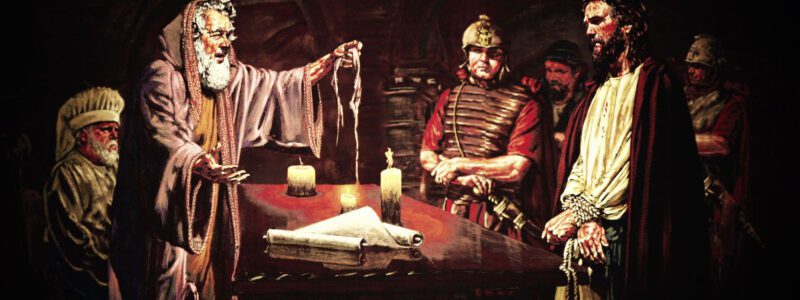Why Christ was Crucified
Precisely why Christ was crucified is a question posed by curious Christians throughout the centuries. There is no real doubt the crucifixion occurred – it is one of the best-documented events in ancient history. The Scriptures, as well as extra-Biblical history, support the historicity of Christ’s crucifixion. Ancient Greco-Roman sources such as Josephus, Tacitus, and Lucian of Samosata confirm that Christ was crucified.
The reason why Christ was crucified is not as obvious to modern Christians who have only marginal knowledge of the Old Testament. As Bart Ehrman, an agnostic, notes,
[If] Jesus had simply been a great moral teacher, a gentle rabbi who did nothing more than urge his devoted followers to love God and one another, or an itinerant philosopher … then he would scarcely have been seen as a threat to the Romans and nails to a cross. Great moral teachers were not crucified – unless their teachers were considered subversive.
Different theories have tried to explain why Christ was crucified. Likely the most popular concerns Christ’s prediction of the destruction of the Temple (Mark 13:2). The Temple was the holiest structure in the world for the Jewish people. But Christ is hardly able to destroy such a huge structure made of huge stones constructed over many decades. While threats against the temple might have gotten him ostracised from the synagogue, it would seem unlikely such idle threats would have resulted in his crucifixion.
Another theory has to do with his overturning the tables of the moneychangers outside the Temple. The Gospel of Mark supports this theory when it notes “the chief priests and scribes heard it and sought a way to destroy him.” Proponents of this theory suspect the rich and powerful Jews probably with connections to the Sanhedrin were not pleased with Christ’s threat to their livelihood. Unfortunately for this theory, there is no record in Scripture that this subsequently leads to his conviction of blasphemy and death.
Blasphemy
Our modern ears are desensitized to what ancient Jews could term blasphemy. We continuously hear our irreligious friends use Christ’s name in an irreligious way so much that it hardly merits consideration.
But in ancient Israel, certain forms of blasphemy could get you killed.
During the trial of Christ, he was brought before the High Priest Caiaphas in the presence of the Jewish governing body known as the Sanhedrin. Mark’s gospel provides the story,
Now the chief priests and the whole Sanhedrin sought testimony against Jesus to put him to death, but they found none. For many bore false witness against him, and their witness did not agree. And some stood up and bore false witness against him, saying, ‘We heard him say, “I will destroy the temple that is made with hands, and in three days I will build another, not made with hands.”‘ Yet now, even so, did their testimony agree. And the high priest stood up in the midst, and asked Jesus, “Have you no answer to make? What is it that these men testify against you?” But he was silent and made no answer. Again, the high priest asked him, “Are you the Christ, the Son of the Blessed?” And Jesus said, “I am, and you will see the Son of Man seated at the right hand of Power, and coming with the clouds of heaven.” And the high priest tore his garments, and said; “Why do we still need witnesses” You have heard his blasphemy: What is your decision?” And they all condemned him as deserving death. (Mark 14:55-64).
Mark relates the story concerning the destruction of the Temple as entering into the trial, but it does not seem to be what got Christ convicted of blasphemy. He is condemned for how he answers Caiaphas’ questions concerning his identity – upon how Christ identifies himself and not about the Temple or overturning the tables of the moneychangers.
Caiaphas realized it would be ridiculous for Christ to pose a serious threat to the Temple and the money changes no doubt righted their tables and gathered up their money and went on with their business. No big deal.
Nor did Caiaphas condemn Christ for being the Messiah who was the long-awaited king of Israel predicted by the Old Testament prophet to Daniel to be appearing during the first century. Everybody was anticipating a Messiah to appear so it would not have been a capital offense to claim that identity.
The reason why Caiaphas got so upset and demanded Christ’s execution was one sentence Christ spoke answering the question, “Are you the Christ, the Son of the Blessed?” Christ answered,
I am, and you will see the Son of Man seated at the right hand of Power, and coming with the clouds of heaven.
With this answer, Christ was alluding to Old Testament Scriptures the Sanhedrin would have known very well. The first is the expression – “son of man.” This alludes back to Daniel 7 which describes
Behold, with the clouds of heaven
there comes one like the son of man
and he came to the Ancient of Days
and was presented before him.
And to him was given dominion
and glory and kingdom,
that all peoples, nations, and languages
should serve him. (Daniel 7:13-14)
Then Christ also identified himself as being “seated at the right hand of Power”,
A Psalm of David,
The Lord says to my lord;
“Sit at my right hand,
till I make your enemies your footstool.”
The scepter of your power the Lord will stretch forth from Zion:
Yours is princely power in the day of your birth, in hold splendor;
From the womb of the dawn, like the dew, I have begotten you. (Psalm 110:1-3)
Both of these Biblical passages alluded to by Christ during his trial proclaim the royal figure as divine. This was the reason why Caiaphas tore his clothing and yelled, “blasphemy!”
The person being described in these two passages is no ordinary person. Adela Yarbro Collins notes,
In this saying, Jesus claims to be a messiah of the heavenly type, who will be exalted to the right hand of God (Psalms 100:1). Being seated at the right hand of God implies being equal to God, at least in terms of authority and power. This allusion to Daniel 7:13 reinforces the heavenly messianic claim.
Christ claims he is not just the Messiah – but the divine Son of God. This is further supported in Christ’s trial before Pilate. Pilate found Christ had done nothing requiring execution but the crowd objected noting,
We have a law, and by that law, he ought to die, because he has made himself the Son of God.
The “law” requiring death for blasphemy is to be found in the Old Testament chapter of Leviticus,
He who blasphemes the name of the Lord shall be put to death.” (Leviticus 24:16)
The Crime of Blasphemy in Ancient Judaism
The idea that Christ was executed for blasphemy (and not for threats against the Temple or overturning some tables) is supported by writings of several ancient well-respected Jewish scholars. Philo of Alexandria – a Jewish contemporary of Christ – defined blasphemy when any man “has dared to compare himself to the all blessed God” (On Dreams, 2:130).
Josephus would agree, noting
Let him that blasphemes God be stoned, then hung for a day, and buried ignominiously and in obscurity. (Antiquities, 4:202).
Josephus was, in essence, saying that when it comes to blasphemy against God, mere execution is not enough. The criminal needs to be “hung” so that all could see the penalty given for blaspheming God.
Summary
Christ was condemned to death because he claimed divinity – he claimed to be the Son of God at his trial. He did this by referring to ancient Old Testament scriptures well known to the Sanhedrin.
He was not executed for misdemeanors such as threatening a building to overturning some tables, but because he claimed divinity.
To the ancient Jewish mind steeped in knowledge of the Old Testament and remembering the explicit laws and punishments required for breaking these laws, blasphemy against God is associated with the death penalty.
The gospels are filled with Christ challenging the authority of the Pharisees – and they were out for revenge. The Pharisees were leaders of the Jewish nation and they expected proper respect and recognition. To be compared by Christ to snakes or the decay within a grave does not give them that respect. They saw their chance for revenge when Christ claimed divinity – and they took it.




